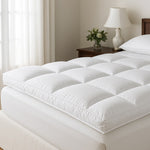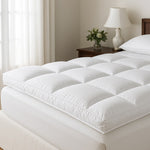You have no items in your shopping cart.

In today’s fast-paced world, difficulty falling asleep is a common problem. Poor sleep will not only leave you drained the next day but also have a detrimental effect on your health and mental well-being. Thankfully, there is a lot of research on sleep patterns available that give us some clues on how to improve our chances of getting a good night’s rest. So, let’s explore some of the ways that your body temperature effects your sleep. By taking the advice of these sleep sceintists, you can take the first steps toward more restful nights and less stressful days.
Set the Thermostat
A neurologist at John Hopkins University studied the ideal room temperature for facilitating sleep. What she discovered is that 65 degrees is the ideal setting. Although she notes that the figure is just a ballpark and typically recommends that patients try settings between 65-69 degrees to find out which works best for them.
The reason this helps us sleep through the night is that the body naturally drops its temperature during sleep, and raises it just before waking. By keeping the body cool, you are helping it regulate your temperature to the optimal level. If your room is too hot, your body might not be able to make the necessary adjustments for proper regulation of your internal temperature.
Since most thermostats in modern homes have timers that can set the temperature differently for different times of day, it might be worth a try setting yours to lower the temperature an hour or so before bedtime, and raise it around the time you wake up. This way your home’s heat or A/C will be in sync with your body’s needs instead of working against them.
Warm Your Feet
Another way to keep your body temperature down at night is to keep your feet warm. This may sound contradictory, but it is all backed by science. Swiss researchers discovered that all of their subjects fell asleep immediately following a shift in blood flow to the hands and feet. When this happens, the body’s heat distribution changes and the rest of the body cools. By warming the feet with a hot water bottle, or by simply wearing socks, you can widen the blood vessels in them and accelerate this change in temperature distribution.
Like adjusting the thermostat, this is another really simple technique that you can try to see if it improves your rest. If you are not already wearing socks to bed, you may even find that having warmer feet at night is more comfortable.
Shower at Night
We’ve examined how the body warms itself during the waking period and cools again when it is time for sleep. After taking a warm shower (or bath) your body naturally cools down. By taking the shower an hour and a half or so before bedtime, you can time this cool down period to match the time at which your body is naturally cooling down for sleep. Like adjusting the thermostat, this helps the body do its job of regulating your temperature. Like the previous two tips, this one is backed by science. Several studies have shown that a warm bath before bedtime can help to induce sleep. The studies focused on baths, but Shelby Harris, the director of behavioral sleep medicine at Montefiore Medical Center in New York, says that it should work just as well with a 20-minute shower.
Unlike the other two tips, this one might require a bigger change in your daily routine. If you are used to taking your shower in the morning to wake up then the switch to showering at night might take an adjustment period. If you are having trouble sleeping, however, the improved rest could very well lead to a more alert morning than that morning shower did.
To ensure that you are getting the best sleep possible, consider paring any of these strategies with a luxurious Queen Anne Pillow. If you’re looking for something on the cooler side, then the Heavenly Down Synthetic Down pillow might be just right for you!

In today’s fast-paced world, difficulty falling asleep is a common problem. Poor sleep will not only leave you drained the next day but also have a detrimental effect on your health and mental well-being. Thankfully, there is a lot of research on sleep patterns available that give us some clues on how to improve our chances of getting a good night’s rest. So, let’s explore some of the ways that your body temperature effects your sleep. By taking the advice of these sleep sceintists, you can take the first steps toward more restful nights and less stressful days.
Set the Thermostat
A neurologist at John Hopkins University studied the ideal room temperature for facilitating sleep. What she discovered is that 65 degrees is the ideal setting. Although she notes that the figure is just a ballpark and typically recommends that patients try settings between 65-69 degrees to find out which works best for them.
The reason this helps us sleep through the night is that the body naturally drops its temperature during sleep, and raises it just before waking. By keeping the body cool, you are helping it regulate your temperature to the optimal level. If your room is too hot, your body might not be able to make the necessary adjustments for proper regulation of your internal temperature.
Since most thermostats in modern homes have timers that can set the temperature differently for different times of day, it might be worth a try setting yours to lower the temperature an hour or so before bedtime, and raise it around the time you wake up. This way your home’s heat or A/C will be in sync with your body’s needs instead of working against them.
Warm Your Feet
Another way to keep your body temperature down at night is to keep your feet warm. This may sound contradictory, but it is all backed by science. Swiss researchers discovered that all of their subjects fell asleep immediately following a shift in blood flow to the hands and feet. When this happens, the body’s heat distribution changes and the rest of the body cools. By warming the feet with a hot water bottle, or by simply wearing socks, you can widen the blood vessels in them and accelerate this change in temperature distribution.
Like adjusting the thermostat, this is another really simple technique that you can try to see if it improves your rest. If you are not already wearing socks to bed, you may even find that having warmer feet at night is more comfortable.
Shower at Night
We’ve examined how the body warms itself during the waking period and cools again when it is time for sleep. After taking a warm shower (or bath) your body naturally cools down. By taking the shower an hour and a half or so before bedtime, you can time this cool down period to match the time at which your body is naturally cooling down for sleep. Like adjusting the thermostat, this helps the body do its job of regulating your temperature. Like the previous two tips, this one is backed by science. Several studies have shown that a warm bath before bedtime can help to induce sleep. The studies focused on baths, but Shelby Harris, the director of behavioral sleep medicine at Montefiore Medical Center in New York, says that it should work just as well with a 20-minute shower.
Unlike the other two tips, this one might require a bigger change in your daily routine. If you are used to taking your shower in the morning to wake up then the switch to showering at night might take an adjustment period. If you are having trouble sleeping, however, the improved rest could very well lead to a more alert morning than that morning shower did.
To ensure that you are getting the best sleep possible, consider paring any of these strategies with a luxurious Queen Anne Pillow. If you’re looking for something on the cooler side, then the Heavenly Down Synthetic Down pillow might be just right for you!








